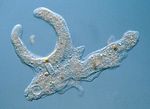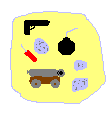User:The fatgoat/Unicellular Organisms
DANGER!! Viewing or reading this page can be deadly ... or worse. If you just got here and are feeling dizzy due to losing a pint of blood from the stump where your arm used to be, please stumble away and call for help, then lay down in the gutter and pass out. |
“In Soviet Russia, kary otes YOU!!”
– Russian Reversal on eukaryotes
“Unicellular organisms are very tiny.”
– Captain Obvious on unicellular organisms
Unicellular organisms are, as the name quite obviously suggests, are a type of organism that have a unicell. They all fall into several categories, including prokaryotes, antikaryotes, and the three Taxidermical kingdoms Archaebacteria, Newaebacteria, and Protista. Several examples include ciliates, flagellates (living primarily in Uranus), amoebas, unicycles, and the Unabomber. These organisms all have each of the characteristics:
- Made of one cell
- Alive
- Not made of two or more cells
- Not made of a negative number of cells
- Not dead
- Not undead
- Very, very, very, very, very, very difficult to see without a microscope, though you can kinda make out a general shape if you squint and take hallucinogenic drugs. But really, you're better off using a microscope.
History[edit | edit source]
Unicellular organisms are the first organisms to ever exist, created on the fifth day by our Lord and Almighty Father to act as entertainment and job-providers for microbiologists. At least, I think. It was one of the first six days. It is well known that they did not begin to form communities together, leading to the evolution of multicellular organisms and specialized cells because, of course, Evolution is false.
Unicellular organisms have no need for adaptation anyways, as they are virtual fortresses. They have a massive, rigid wall to protect from enemy invaders, elite war machines called mitochondria, and booby traps called lysosomes, which melt enemy intruders. Really, what is there to improve on?
Unicells[edit | edit source]
The term "unicell" comes from the Latin roots uni, meaning "one" and cell meaning "small area enclosed by metal bars used to hold prisoners". It was named as such because unicellular organisms are often used in jails around the world.

Of all unicellular organisms, amoebas are the most often used because of their cheapness and great containment abilities even though they’re often less than a single millimeter in width. In fact, they are capable of holding a bunk bed, a lavatory, and several rather large, hairy inmates named Bubba, as well as a fraction of a last inmate who is not named Bubba. To determine how many inmates are to be fit into a single amoeba, the following formula is used:
Whereas is the volume of the amoeba and is the average volume of the inmates. Whenever this equation results in a number less than one (which is a lot), an inmate is sliced into tiny pieces for containment in numerous amoebas.
Also, in the field, the amoeba is a massive blob of terror that easily absorbs new prisoners and fugitives, sometimes even dissolving them for nutrients, eliminating the need to be fed. Of course, this disintegration is fatal for the absorbed convict. As such, in some areas of the world, death by amoeba has begun the process of replacing other methods of execution. In Washington and New Hampshire, those sentenced to death can choose to die by either lethal injection, hanging, firing squad, or amoeba.
The Nuclear Debate[edit | edit source]
Since the Manhattan Project, lead by J. Robert Oppenheimer, first nucleus was synthesized through the tight packing of deoxyribonucleic acids (DNA) in 1945, there has been an ongoing dispute about the nucleus’ uses. Some believed that nucleic weapons such as nuclear membranes and nucleoli were beneficial and helped keep the world from war. Others believed that nucleic weapons were far too dangerous and powerful for the world. A famous unicellular organism named Mohandas Kary Gandhi fought actively against nuclei (but in a wimpy pacifist way; he wasn’t punching proponents for nuclei, or oxidizing deoxyribonucleic acids while preventing the production of ribonucleic acid strands), his name and ideas becoming widespread enough for those against nuclei to begin calling themselves prokaryotes. Today, their name has been simplified to "whiny babies and pussies"; their opponents: "Klingons".
Crime and Punishment[edit | edit source]
In the famous book by Fyodor Dostoevsky, unicellular organisms played a very significant role. Some debate that unicellular organisms may have had no role at all, but this is not true. Well, actually it is true. Unicellular organisms were not much involved in the book Crime and Punishment, although they were responsible for making all the characters go bat fuck insane.
Bacteria[edit | edit source]
- Warning: the following section was written by someone who is addicted to hand sanitizer and afraid of quite nearly everything. Also, they are a paranoid loony.
THEY’RE EVERYWHERE!!! They’re on your hands, on your skin, on your face, in your hair——THERE’S NO ESCAPE!! They know where you live, they know where you sleep, they know whether you prefer waffles or pancakes! You can’t run; you can’t hide! They’ll get you! And when they get you, they’ll get you good! They’ll always find you! So run away! Shower constantly! Become addicted to hand sanitizer! ISOLATE YOURSELF IN A SMALL WHITE ROOM!!! BUT THAT WILL EVENTUALLY BE PENETRATED!! AND YOU CANNOT LET THEM TAKE YOU ALIVE!! YOU MUST [[|Suicide|SHOOT YOURSELF]]!!! AND SHOOT YOURSELF AGAIN TO MAKE SURE YOU DIE BEFORE THEY GET YOU!!!! AAAAAAAAAAAHHH!!!!!!
- Warning: the following paragraph was not written by a loony. Thus, expect not to laugh. Expect to not laugh. Not expect laugh to. To laugh expect not; laugh not for it is expected. Not.
Bacteria, of all unicellular organisms, are quite possibly the most diabolical. I mean, they're really evil, and when I say really evil, I mean they're really evil. I mean totally, ruthlessly evil. They'll savagely murder your family and consume their bodies. They kill babies every day. They eat corpses. They're so incredibly disgusting, it will make you vomit. Worst of all, they feel no remorse. They don't think when they kill. They don't even think at all. And do they care? No! So kill them! Kill the bastards!! KILL THEM ALL!!!!
- Warning: the previous warning was false.
On a completely unrelated note, bacteria are prokaryotes that hate anti-bacterial soap. They are also very boring and very uninteresting; much like this paragraph is so far. And that's all there is that can be said for bacteria.
- Warning: the previous section (well, technically this section) of this article was filled with a large amount of unecessary warnings that tend to be rather ugly eyesores.




